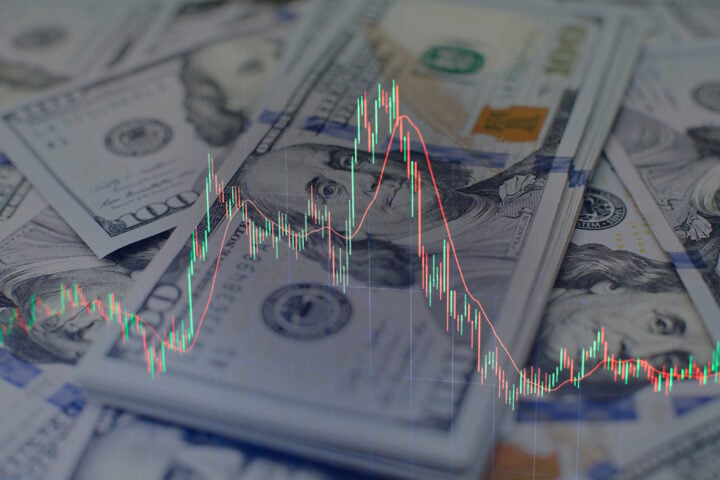U.S. stocks slipped on Wednesday as growing concerns over escalating geopolitical tensions in the Middle East and rising oil prices cast a shadow over the market. Investors remain cautious as they await Israel’s potential response to a missile attack from Iran, fueling worries about possible disruptions in global oil supply chains.
By midday, the S&P 500 had fallen 0.3%, extending the decline it experienced on Tuesday. The Dow Jones Industrial Average was down by 14 points, or less than 0.1%, while the Nasdaq composite dropped 0.4%, reflecting the continued uncertainty across major stock indexes.
Oil Prices Soar Amid Heightened Middle East Concerns
One of the driving factors behind the market’s subdued performance was the sharp increase in oil prices. Crude oil prices surged roughly 3%, with Brent crude topping $75 per barrel. Investors are worried that any escalation of conflict in the region could disrupt oil exports, particularly from Iran, a major producer, even though Israel is not a significant oil exporter. Fears of the conflict spreading to other oil-rich nations have reignited concerns about global supply chain stability.
Earlier in the year, oil prices had been on a downward trajectory due to weakening demand, but this sudden spike has renewed inflation fears and the possibility of broader economic instability. U.S. energy companies, however, saw gains as a result of the price jump. Exxon Mobil shares rose 2%, contributing to a 5.7% increase for the week as investors sought refuge in the energy sector amid rising prices.
Market Movers: Mixed Fortunes for Major Corporations
While energy stocks benefited from rising oil prices, not all companies fared well on Wednesday. Humana saw a dramatic 20.5% drop in its stock price after the health insurer warned that a dip in its Medicare Advantage ratings could hurt revenue in 2026. The company attributed the issue to errors in calculations by the Centers for Medicare and Medicaid Services and is contesting the figures.
Nike, despite exceeding profit expectations for the quarter, experienced a 7.8% decline in its stock price. The company’s revenue missed analysts’ forecasts, raising concerns about its future under incoming CEO Elliott Hill, who faces the challenge of revitalizing the brand. In a move that added to investor uncertainty, Nike withdrew its full-year financial forecast and postponed its upcoming investor day conference.
Conagra Brands, the parent company behind well-known brands like Duncan Hines and Hebrew National, also faced a challenging trading session. Its stock dropped 8.7% after the company reported weaker-than-expected profits, blaming temporary disruptions in production during the peak grilling season.
Tesla, too, weighed on the market, with its stock falling 5.8%. While the electric vehicle maker posted its first quarterly increase in deliveries this year, the numbers fell short of what investors had anticipated, leading to a decline in share price.
Bond Yields Rise as Job Market Shows Strength
In the bond market, Treasury yields climbed following an unexpectedly strong report on U.S. private-sector hiring. The ADP Research report revealed that private employers added 143,000 jobs last month, surpassing predictions and demonstrating the continued resilience of the U.S. job market, despite the Federal Reserve’s tight monetary policies.
The yield on the 10-year Treasury rose to 3.81%, up from 3.73% on Tuesday, while the two-year Treasury yield increased to 3.65% from 3.61%. These moves signal investor uncertainty about the Federal Reserve’s future plans for interest rates, with traders now anticipating a smaller, quarter-point rate cut instead of a more aggressive reduction.
Global Markets Show Mixed Reactions
International markets displayed varied responses on Wednesday. In Hong Kong, the Hang Seng index jumped 6.2%, buoyed by positive investor sentiment following recent economic stimulus measures from Beijing. Trading volumes were high in Hong Kong as Chinese markets remained closed for a holiday. Meanwhile, Japan’s Nikkei 225 continued its pattern of sharp swings, falling 2.2%, while European markets posted mixed results as global uncertainty persisted.
As geopolitical tensions, rising oil prices, and fluctuating economic indicators dominate investor attention, markets remain volatile. Investors are now looking ahead to Friday’s U.S. government report on the broader labor market, which could provide further insight into the health of the economy amid ongoing inflationary pressures and the Federal Reserve’s monetary tightening efforts.







